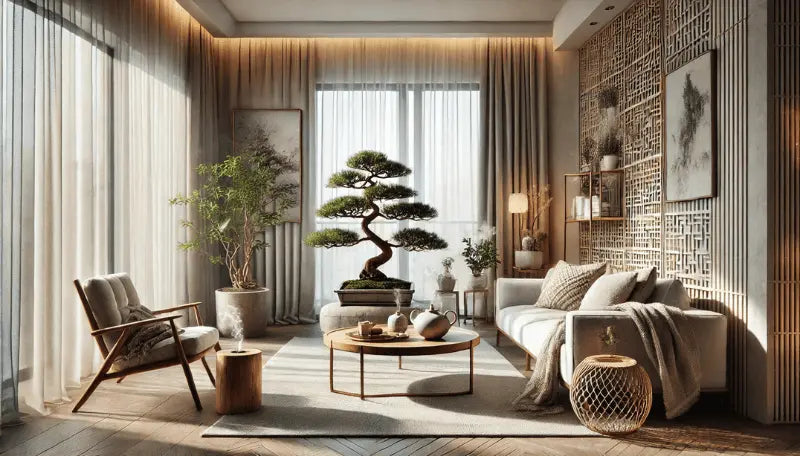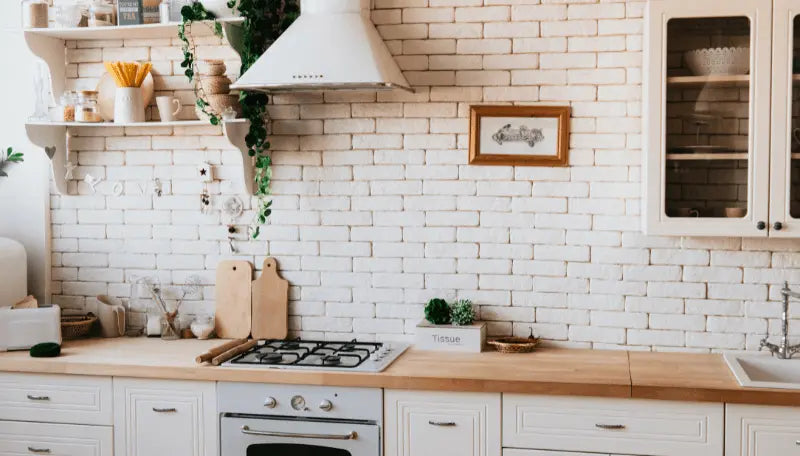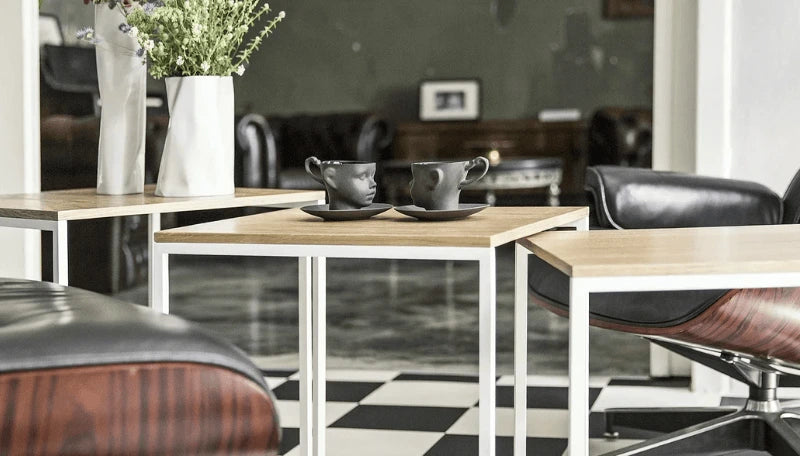Have you ever wondered why some spaces make you feel comfortable and energized, while others seem overwhelming? The key to this lies in the right balance of surroundings, which can affect our well-being, relationships, and daily functioning.
The art of harmonious interior design is based on the principles of free flow of energy. The key concept in this philosophy is Chi – the life force present in people, nature and space . When it circulates without obstacles, it promotes balance and good mood.
Equally important is the principle of feng shui arrangement , also known as the principle of the five elements , which influence the atmosphere in a given place:
Earth – stability and security, Fire – motivation and expression, Water – peace and intuition, Metal – clarity and concentration, Wood – development and creativity.
Contents:
Basic Principles of Feng Shui
Every environment influences our lives – both physically and emotionally. The art of arranging space, based on centuries of tradition, aims to create a harmonious environment in which energy circulates freely, supporting the well-being of the household.
Yin and Yang Balance – The Key to Balance
The basic principle of this philosophy is the balance of opposing forces – Yin and Yang. Yin symbolizes peace, softness and relaxation, while Yang is dynamics, movement and activity. An excess of one of these energies can lead to anxiety or stagnation, so it is worth taking care of their proper proportions in each space.
Yin should dominate the bedroom – delicate fabrics, subdued colours and subtle lighting promote relaxation.
It is worth introducing more Yang into the office or living room – bright, well-lit interiors with dynamic accents will stimulate creativity and activity.

Key principles of space organization
Proper interior design is based on several universal principles:
Free flow of energy – avoid cluttered spaces and arrange furniture so that it does not block natural movement.
Order and minimalism – clutter disrupts the flow and can make you feel tired.
Natural materials and light – wood, stone and water strengthen the connection with nature, and good lighting improves well-being.
These basic rules are the foundation of a harmoniously organized interior. In the next section, we will look at how to apply them to individual rooms so that each zone in the home supports health, peace, and positive energy.
Feng Shui in Individual Rooms
Each interior in the home has a specific function and requires adjustment to the natural rhythm of energy. The principles of feng shui arrangement help create a space that promotes balance, health and prosperity.
Bedroom - balance and regeneration
The bedroom is one of the most important places in the house, because it is here that the body regenerates and rests after a long day. The principles of feng shui in the bedroom focus on maintaining a balance between peace and energy protection.
Colours should be subdued and warm, such as beiges, pastel blues or light greens, as they promote relaxation.
Another important aspect is the positioning of the bed – the best position is one in which the headboard is against the wall and the sleeping person has a view of the door, but is not directly opposite it.
Mirrors in the bedroom require consideration – their inappropriate placement can cause excessive energy stimulation and disrupt sleep.

wooden bedside table for bedroom
Living room – a balance between activity and relaxation
The living room is the center of family life and a meeting place, so it should facilitate both interaction and relaxation.
The principles of feng shui in the living room suggest arranging furniture in a way that allows the free flow of energy - the sofa should be adjacent to the wall, creating a stable and friendly space, while the lighting should be varied, combining natural light with warm lamps of varying intensity.
When designing an interior, it is worth including elements related to nature, such as wood, plants and soft fabrics that introduce balance.
Kitchen - health and well-being
The energy of the kitchen directly affects the health of household members, so its organization should promote the harmonious flow of life forces.
The feng shui kitchen combines the elements of Fire and Water, so it is important to avoid their immediate proximity - the sink and stove should not be next to each other.
The choice of colours also matters – earthy shades such as beige, brown or yellow introduce stability and a sense of security.
It is also worth keeping the kitchen space tidy, as too many unnecessary items can block the flow of Chi.
Bathroom and hallway - energy control
The bathroom is a space where energy often escapes from the home, so it is important to take preventative measures. Feng shui rules for the bathroom suggest keeping the door closed at all times and the toilet lid down, which helps to keep the energy flowing freely.
The hallway, on the other hand, acts as a gateway through which energy enters the interior of the home. The principles of feng shui in the hallway indicate the importance of a bright, well-lit entrance and minimizing clutter that can block the flow of positive vibrations.
Mirrors in this part of the home can amplify the energy, but should be positioned so that they do not reflect the front door, which could cause it to escape.
Office – efficiency and focus
The workspace should be conducive to concentration and creativity. The principles of feng shui in the office emphasize the importance of proper desk positioning – it is best when it is in the so-called "power position", i.e. facing the door, but not on its direct axis.
Suitable wall colors, such as green and blue, promote concentration and relaxation. It is also worth adding potted plants, which help purify the air and increase the quality of Chi Energy in the room.

Children's room - a balance between peace and dynamism
A child’s space should support both their development and rest. Children’s feng shui suggests that the bed should not be placed directly under a window or in line with a door, which could disrupt sleep.
It is worth choosing delicate, pastel colours that promote calm, but at the same time add dynamic accents that stimulate creativity.
The lighting in the room should be well balanced to provide adequate conditions for studying and relaxing.
Garden - natural balance
The space around the house affects internal balance, which is why a Feng Shui Garden should be designed in a way that harmonizes all elements of nature.
It is important to take into account the five feng shui elements that should work together - stone representing the Earth, water in the form of a pond or fountain, wood in the form of vegetation, light symbolizing Fire and metal decorative elements.
Paths should be gently curved to encourage natural flow. Sharp, angular plants can disrupt balance, so choose species with soft, rounded leaves.
Practical Feng Shui Techniques
Applying the principles of feng shui in space requires not only appropriate interior design, but also the skillful selection of decorations, colors and elements that support the free flow of energy.
Regardless of whether you are just starting your adventure with this art of arrangement or you want to improve your interior, it is worth introducing changes gradually, step by step, to adapt the space to your own needs .
How to implement changes step by step?
It is best to start implementing feng shui principles by analyzing the current state of the interior. Feng shui techniques are based on simple but effective actions that improve the flow of Chi and help create a harmonious space.
The first step is to tidy up your surroundings. Excess items, unnecessary decorations and cluttered corners can block energy, leading to stagnation and a sense of overwhelm. Order is the foundation of balance – it is worth getting rid of unnecessary things regularly and taking care of a well-organized space .
Another element is the correct arrangement of furniture . Feng shui interior design assumes that key elements, such as a bed, desk or sofa, should be in the so-called power position, i.e. so that a person sitting or lying down can see the entrance to the room, but is not located on its direct axis.
The role of decorations, colors, mirrors and plants
Properly selected feng shui decorations have a huge impact on the atmosphere of the interior. Every element, from the colors of the walls to the accessories, should support harmony and meet the specific needs of the residents.
Feng shui colours play a key role in arranging a space. Each of them is associated with one of the five elements and influences the energy in the room. Delicate pastels and beiges promote relaxation, while intense shades of red or orange stimulate activity and creativity.
Mirrors can enhance the flow of energy, but their improper placement can lead to its disruption. They should not be placed opposite the entrance door, as they can reflect and "push" positive energy out of the house. In turn, placing a mirror so that it reflects a beautiful decoration or natural light enhances the harmony of the interior.
Plants play an important role in improving the quality of Chi Energy. Vivid greenery, especially plants with rounded leaves, promotes the flow of positive energy and purifies the air. Prickly plants, such as cacti, can block harmony, so it is recommended to limit them, especially in resting places.
The use of the Bagua Grid in space arrangement
The Bagua grid is one of the most important tools in feng shui, allowing for conscious management of space. It divides the interior into nine zones, each corresponding to a different aspect of life, such as health, career, wealth or relationships.
To use the Bagua Grid in interior design, it is worth:
- Sketch out a plan of your apartment and overlay a grid on it, identifying which parts of the house fall into which areas.
- Strengthen selected zones with appropriate colors, materials and decorative elements. For example, in the wealth zone it is worth placing accents related to the element of Water, e.g. a fountain or paintings of waterfalls, and in the career zone items in shades of black and navy blue will work well.
- Avoid energy blockages – if there are unnecessary objects or obstacles in strategic places in the home, they can inhibit development and success in a given area of life.
How to avoid mistakes and common pitfalls?
While feng shui offers many effective methods for improving the quality of life, some mistakes can have the opposite effect. The most common trap is unconsciously blocking the flow - cluttered rooms, too many decorations, and poorly arranged furniture can cause Chi energy to become trapped, affecting the well-being of the household.
It is also a mistake to use only one of the elements in a given room. For example, too much Fire in the form of intense reds, harsh light and dynamic decorations can introduce chaos and excitement instead of supporting harmony. On the other hand, too much Water in the form of dark colours and calm images can lead to a feeling of stagnation.
The key is to find a balance between the five elements of feng shui.
When implementing feng shui practices, it is worth remembering that each change should be tailored to individual needs and felt as natural.
Introducing harmony into a space is not about strictly following the rules, but about skillfully adapting them to the lifestyle and preferences of the household members.
Summary
Introducing the principles of feng shui into your home does not require major renovations or radical changes. The key to success lies in gradually adapting the space to support harmony, health and positive Chi energy.
The most important thing is a conscious approach to interior design and eliminating barriers that may block the free flow of energy in the rooms.
How to start implementing feng shui in your environment?
The first step is to organize your space. Too much stuff and chaos can disrupt the free flow of energy, so it's worth paying attention to order and proper organization.
After removing unnecessary items, it is worth gradually adjusting the arrangement of furniture so that it does not block natural energy paths. It is also important to pay attention to feng shui colors, which can strengthen certain areas of life - from colors that promote relaxation in the bedroom to dynamic accents that stimulate creativity in the office.
Adjusting decorations and accessories, such as mirrors, plants, and appropriate lighting, allows for better management of space and its impact on well-being. It is also worth considering the Bagua Grid to determine which areas of the house correspond to specific areas of life and how to strengthen them.

The benefits of feng shui for health and well-being
A well-thought-out interior design can significantly affect the quality of life. Good feng shui promotes better sleep, reduces stress levels and increases the sense of comfort in your own home. A space adapted to the natural rhythms of Chi energy helps improve concentration, relationships with loved ones and general well-being.
One of the key aspects of this practice is maintaining balance between the five elements. Their harmonious presence in the environment can support health, motivation and a sense of inner stability.
Experimenting with different schools of feng shui
Feng shui is an ancient art of arranging spaces that has evolved over the centuries, giving rise to various approaches and schools. There is no one-size-fits-all approach to creating the perfect space – it is worth trying different techniques and methods to find those that work best with your individual lifestyle.
Implementing feng shui does not mean having to strictly adhere to every rule. The most important thing is that the space reflects the goal of feng shui, which is to support well-being, health and harmony. Experimenting with furniture placement, colors or decorations can be an interesting process that will allow you to better understand how space affects everyday functioning.
Whether you choose to make minor changes or completely transform your environment, feng shui practices can help you create a space that promotes peace, balance, and success.






